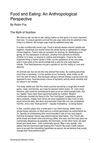Food and Eating: An Anthropological Perspective
– By Robin Fox
The Quest for the Holy Quail
This goes along with the modern obsession with diets. Previously, diets were only for health reasons, rarely to do with weight and appearance as such. Now they are mainly concerned with weight reduction, significantly referred to as "slimming," the slim figure rather than the healthy body being the aim despite pious claims to the contrary. They are a major part of the food-fashion industry. In fact, none of them work. If any one did, then there would not be so many and we would not be faced almost weekly with the announcement of a new and infallible one. They come in quick succession: the Scarsdale Diet, Nathan Pritikin’s Maximum Weight Loss Diet, the Palm Beach Diet, the Rotation Diet, the Beverly Hills Diet, Dr. Atkin’s Diet Revolution, the Banana-Milk Diet, the I Love New York Diet, Kempner’s Rice Diet, the Magic Mayo Diet, Dr. Stillman’s Quick Inches Off Diet, and numerous others. (Note the use of "classy" names to attract the diet snobs. It’s amazing that we haven’t had the Harvard Diet yet - the Princeton Diet has arrived. The magic of California as diet heaven has given us the UCLA Diet, or the California Slim, as it is popularly known.)
In fact, in order to lose weight (and this is only "healthy" in extreme cases), the only useful diet is to exercise and eat much less food, as Dr. Howard fully understood. But the business of how not to eat too much food has paradoxically turned into one of the biggest food industries. It has become the science of what to eat and not gain weight - more or less impossible with any reasonable calorific regime. Studies have shown that diets more often than not lead to weight gain! Because the body does not know the difference between dieting and starving, once a severe dietary regime is concluded it will voraciously store food as fat as a protection against further unreasonable onslaughts. But it is with diets that fashion and fads play their largest part. Diets have replaced the weather as the basic item of polite conversation.
This is all part of a general utopianism that characterizes Western society: the search for the perfect life comes to embrace the search for the perfect food (the Quest of our section heading). And, like other utopianisms, this easily tips over into fanaticism. With the zeal of religious sectarians, people organize to hunt down restaurants that offend against the latest dietary fads. The New York Daily News has a full-time food reporter whose job is to make surprise visits to restaurants to test the cholesterol levels in their foods, and to award a special symbol - a heart crossed with a knife and fork - to those combining low levels with "gourmet"-quality food. In fact, there is no scientific evidence that dietary cholesterol on its own is harmful; it only becomes so when it interacts with saturated fat. But that gets too complicated for the tabloids dedicated to protecting us from the wickedness of non-cholesterol-conscious cooks. In the pursuit of perfection, to be on a diet illustrates that you are a worthy and serious person, not a slob. It is the Puritan Ethic applied to food. It has also spawned the monstrosity known as (of course) "nouvelle cuisine" in which infant-sized portions are arranged with cubist sensitivity and pastel-colored sauces, and which drive normal adults to consume huge numbers of dinner rolls to avoid a feeling of starvation. Obesity has become for our present age what adultery was for our Victorian forebears. The real modern descent into sin and wickedness is a dieter who goes on a junk food binge. And hunting down offenders against food purity joins the list of popular witch hunts along with smokers, polluters, and people who use sexist pronouns. The State of New Jersey, in one of those frightening flashes of "Big Brother Knows Best" that frequently overtake governments, passed a law that forbad the serving in restaurants of fried eggs "sunny side up" because of the danger (slender) of salmonella poisoning. Public outcry caused it to repeal this food fascism in short order, which restores one’s faith in the vox populi - a bit.


